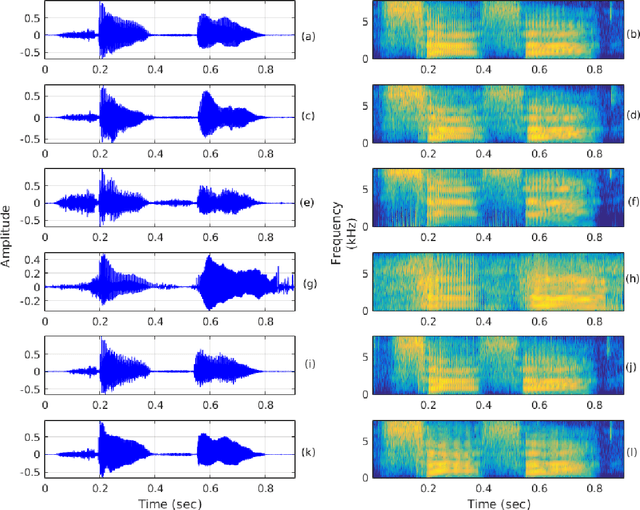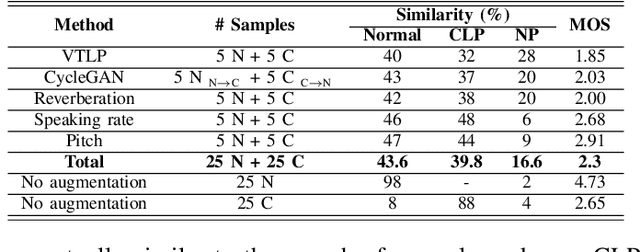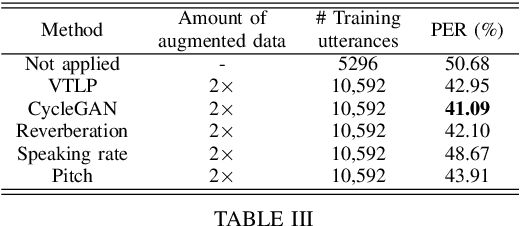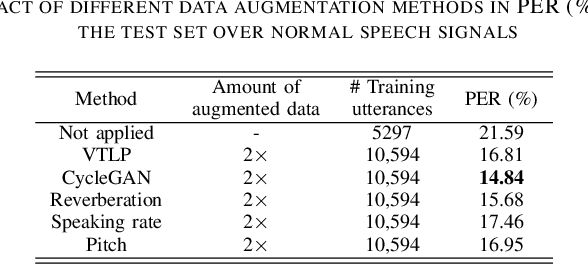Protima Nomo Sudro
Significance of Data Augmentation for Improving Cleft Lip and Palate Speech Recognition
Oct 02, 2021



Abstract:The automatic recognition of pathological speech, particularly from children with any articulatory impairment, is a challenging task due to various reasons. The lack of available domain specific data is one such obstacle that hinders its usage for different speech-based applications targeting pathological speakers. In line with the challenge, in this work, we investigate a few data augmentation techniques to simulate training data for improving the children speech recognition considering the case of cleft lip and palate (CLP) speech. The augmentation techniques explored in this study, include vocal tract length perturbation (VTLP), reverberation, speaking rate, pitch modification, and speech feature modification using cycle consistent adversarial networks (CycleGAN). Our study finds that the data augmentation methods significantly improve the CLP speech recognition performance, which is more evident when we used feature modification using CycleGAN, VTLP and reverberation based methods. More specifically, the results from this study show that our systems produce an improved phone error rate compared to the systems without data augmentation.
Processing Phoneme Specific Segments for Cleft Lip and Palate Speech Enhancement
Oct 02, 2021



Abstract:The cleft lip and palate (CLP) speech intelligibility is distorted due to the deformation in their articulatory system. For addressing the same, a few previous works perform phoneme specific modification in CLP speech. In CLP speech, both the articulation error and the nasalization distorts the intelligibility of a word. Consequently, modification of a specific phoneme may not always yield in enhanced entire word-level intelligibility. For such cases, it is important to identify and isolate the phoneme specific error based on the knowledge of acoustic events. Accordingly, the phoneme specific error modification algorithms can be exploited for transforming the specified errors and enhance the word-level intelligibility. Motivated by that, in this work, we combine some of salient phoneme specific enhancement approaches and demonstrate their effectiveness in improving the word-level intelligibility of CLP speech. The enhanced speech samples are evaluated using subjective and objective evaluation metrics.
Enhancing the Intelligibility of Cleft Lip and Palate Speech using Cycle-consistent Adversarial Networks
Jan 30, 2021



Abstract:Cleft lip and palate (CLP) refer to a congenital craniofacial condition that causes various speech-related disorders. As a result of structural and functional deformities, the affected subjects' speech intelligibility is significantly degraded, limiting the accessibility and usability of speech-controlled devices. Towards addressing this problem, it is desirable to improve the CLP speech intelligibility. Moreover, it would be useful during speech therapy. In this study, the cycle-consistent adversarial network (CycleGAN) method is exploited for improving CLP speech intelligibility. The model is trained on native Kannada-speaking childrens' speech data. The effectiveness of the proposed approach is also measured using automatic speech recognition performance. Further, subjective evaluation is performed, and those results also confirm the intelligibility improvement in the enhanced speech over the original.
 Add to Chrome
Add to Chrome Add to Firefox
Add to Firefox Add to Edge
Add to Edge